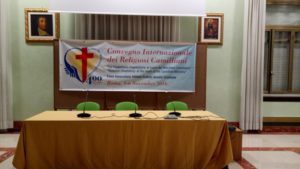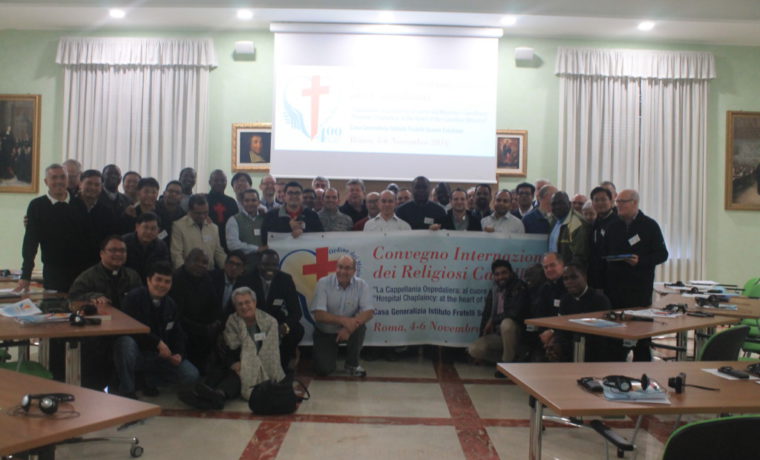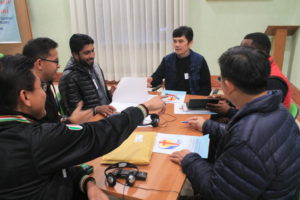 international conference of camillian religious
international conference of camillian religious
‘The Hospital Chaplaincy at the Heart of the Camillian Ministry’
Rome, 4-6 November 2016
FINAL DOCUMENT
Being hospital chaplains today: prophecy and a missionary approach
At end of the meeting which saw us with passion and enthusiasm explore subjects and problems that were addressed with wisdom by the various speakers and with the profound involvement of those of us who took part, we want first of all to express thanks to the Lord, to his spirit of love, above all else for the atmosphere of fraternity in which the deliberations took place, an atmosphere of openness and careful listening, of honest and free sharing, and of cordial emotional-affective participation.
We want by this short document to emphasise and share with the whole of the Order, with those who were not able to take part, some questions and issues which seem to us to be relevant to the specific activity of hospital chaplains but above all to the very future of our institute and the vitality of the Camillian charism, which once again has been shown to be needed by the holy Church of God and the civil societies in which we work.
We have sought to condense in eight points what emerged from the meeting. They do not cover everything that was analysed and decided by the assembly and by the groups. They involve emphases that should certainly be taken up again, and also corroborated by reading the various papers and summaries of the work groups etc. which, indeed, we hope to be able to make available to everyone soon.
- Being prophets in a secularised society in which secularisation, indifference and exclusion, but also many forms of religiosity, are present at the same time. This is a challenge that is very evident to the Ministers of the Sick who are present in the five continents of the world and every day face up to the need to find the rights words, accompanied by those gestures that manifest Presence and which on their own know how to speak about God, about his mercy towards the whole of humanity, and above all the most suffering and frail of this humanity.
- The primacy of the Word: in order to be evangelisers in the world of suffering we must rediscover the primacy of our personal and communal relationship with the Lord, a relationship that is generated and given substance every moment of our lives – and above all our ministerial lives – not by us but by the Lord himself. We must maintain a constant assiduousness in listening to his Word.
- The search for, and care of, spirituality: once again the Camillian message and charism require that we have intense spiritual lives, without which every activity of ours is not an expression of that ‘new form of charity’ which is at the heart of the charism itself.
- The development of humanity: understanding the joys, the hopes and the sadness of the whole of humanity, and of those of its members who suffer today, is the great gift of the Camillian charism which places the Christ of God and man at the centre of things.
- The exercise of tenderness: this is the special feature of the Camillian style in nearness to suffering people and is a typically human and humanising quality. It should not be misunderstood as sentimentalism or weakness. It is, rather, a feeling that makes a person affectionate, a joint-participant, full of respect towards the person who asks us for attention and healing.
 The challenges: we identify these in accompanying people who are non-believers or of different religions; in accompanying those who are at the terminal stages of their illnesses and have a vast set of problems of an ethical, health-care, psychological, emotional and affective character; in accompanying families, above all in the working through of their mourning; and in accompanying health-care personnel so that they, too, can be a concrete visible expression of the ‘hundred arms’ that St. Camillus wanted to support his work.
The challenges: we identify these in accompanying people who are non-believers or of different religions; in accompanying those who are at the terminal stages of their illnesses and have a vast set of problems of an ethical, health-care, psychological, emotional and affective character; in accompanying families, above all in the working through of their mourning; and in accompanying health-care personnel so that they, too, can be a concrete visible expression of the ‘hundred arms’ that St. Camillus wanted to support his work.- Lastly, we pay especial attention, and give especial responsibility, to the Camillianum Institute which over the last thirty years has helped to train chaplains and pastoral workers from various parts of the world. We hope that it will not offer general cultural formation, but, rather, that it will cultivate openness and greater dedication to specific ongoing formation and to research in the field of health and the theology of pastoral care in health so that it can help us, and the whole of the Church, to read the ‘signs of the times’ in history, thereby contributing to the ‘integral health’ of the men and women of our time.
- Hopes and commitments as regards the future, not only for the ministry of hospital chaplains but also for the whole of the Order, can be seen in the need that today’s Church and societies (the plural here refers to the respect that is due to the various cultures and traditions that exist) have for the Camillian charism, obviously lived and actualised in this history that we are constructing with the whole of humanity. They are hopes and commitments that require careful discernment, for which we ask for the help of the Spirit of Love so that we will always manage to understand his will, the light whispering that involves and calls for our attention and also our freedom.
All of us who have taken part in this conference, in the reasonable certainty of interpreting at this moment, as well, the ‘dream’ of the Lord about us and our Order, express the wish that we will achieve what was perceived together with our brothers and sisters who, in various capacities and in various ways, share with us the charism that was given by the love of the Trinity to our venerated and loved father St. Camillus.
For the Secretariat for Ministry
Rome, 9 November 2016
















Camillians on Facebook
Camillians on Twitter
Camillians on Instagram